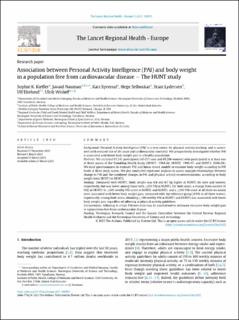| dc.description.abstract | Background: Personal Activity Intelligence (PAI) is a new metric for physical activity tracking, and is associated with reduced risk of all-cause and cardiovascular mortality. We prospectively investigated whether PAI is associated with lower body weight gain in a healthy population. Methods: We included 85,243 participants (40,037 men and 45,206 women) who participated in at least one of three waves of the Trøndelag Health Study (HUNT1: 1984-86, HUNT2: 1995-97, and HUNT3: 2006-08). We used questionnaires to estimate PAI, and linear mixed models to examine body weight according to PAI levels at three study waves. We also conducted regression analyses to assess separate relationships between change in PAI and the combined changes in PAI and physical activity recommendations, according to body weight from HUNT1 to HUNT3. Findings: Compared with HUNT1, body weight was 8.6 and 6.7 kg higher at HUNT3 for men and women, respectively, but was lower among those with ≥200 PAI at HUNT3. For both sexes, a change from inactive (0 PAI) at HUNT1 to ≥100 weekly PAI-score at HUNT2 and HUNT3, and a ≥100 PAI-score at all three occasions were associated with lower body weight gain, compared with the reference group (0 PAI at all three waves). Importantly, among both sexes, obtaining ≥100 weekly PAI at HUNT1 and HUNT3 was associated with lower body weight gain regardless of adhering to physical activity guidelines. Interpretation: Adhering to a high PAI over time may be a useful tool to attenuate excessive body weight gain in a population free from cardiovascular disease. | |
